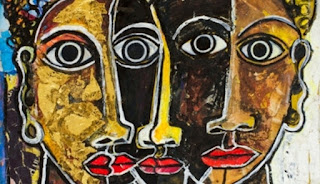5 Things We Can Do to Change the World
 |
Blue Face. Artwork by Ernest Katantazi Mukasa
|
1. Listening to people of color. The gaslighting that perpetuates and protects racist ideology is extremely dangerous. It paves the way for microaggressions and other types of violence. When a person of color says, "that offends me," don't correct them. Listen and offer to take action. "I will do better. Thank you for telling me." Then do your own research and change or remove that joke/vocabulary/behavior from your repertoire. This is the same notion as believing victims. A concept that we see at the center of the me too narrative. How do we expect to eradicate systems of hate if we refuse to even listen to and believe those most effected?
2. Please stop conflating diversity with inclusion and don't equate, equity with equality. Diversity is the representation of visible and invisible variances between individuals. Just because you hired one womxn of color doesn't mean that they will feel comfortable going to work as their true selves. If no one else at the company looks like them, if no one in leadership looks like them, if they are constantly overlooked for promotions-you have helped to maintain a system of oppression. You have created diversity but not an inclusive environment.
Equity is meeting people where they are. Folks will need different things to succeed depending on where they came from. Equality is ignoring things like race, class, generational trauma, historical marginalization and giving everyone the same thing to succeed. For instance, my mom was telling me how Apple recently donated a bunch of computers to a school where the majority of student's families were homeless. While new computers are great and may allow students to be better prepared for when they enter the workforce in 5-10 years, what about installing washing machines or showers? How about providing hot meals? New computers are great but a school whose student body is struggling for bare essentials - this equality approach leaves a lot of gaps.
3. If you are a white person participating in Equity & Inclusion work and profiting from it, ask yourself why. As a queer black woman, I take on the emotional and psychological weight of going into mixed rooms and educating people about these systems, that were designed to keep people like me out. It is as grueling as it is necessary. If you identify as white and are taking on this work in a paying position, I implore you to ask yourself some questions.
- What is the cost of engaging in such work with this identity?
- Is there a need for my contribution?
- Is there a someone else, who I may not know personally, who is doing this same work?
If you reflect upon those questions and decide to move forward, support others in the field who may not have the capital or resources that you may have access to. Partner with them. Recommend them. Listen to them. There are white facilitators who hire black/indigenous/people of color and pay them more than (or part of) their take. Some donate part of their earnings to companies that are owned by marginalized community members.
To conclude, if you are a white facilitator who engages in this work (for a paycheck) ask yourself, who else was up for this job? Did a person of color submit a bid? Did I win because white people are more likely to hire other white people? Did I point that out to those who hired me? Did I get the other company paid somehow (partnerships, recommendations, consulting, etc.)? Because otherwise you are part of the problem.
4. (This is geared more for professionals.) If you hire a DEI Director, are you allowing them to do their job? Is their role as DEI Director known to the rest of the company? Is their role included on the website? Is their contact information on the website? Is their presence visible to anyone entering your company or is it hidden away? Is their position as DEI Director only a second title tacked onto their primary role at the company? Do you allow them to make changes to the organization's hiring practices, everyday policies, and implement trainings and disciplinary actions? Change is uncomfortable but you have to move forward.
5. Stop policing others. Whether it is the pronouns one uses, the clothes they wear, or the way they speak, it is who they are. They should not have to alter their hair or way of speaking for you to hire them. This is something on my mind as I gear up for interviews for a summer law gig. Shall I pull my hair into a bun? Am I a hypocrite for considering it? Should I hope that whoever hires me will do so with my fro? Does that mean they are more inclusive or does it mean I am an exotic token? Who knows? My grandmother would say to straighten my hair.
In a state where there is no law protecting me from being fired for wearing my natural hair, how do I proceed? My afro is a political act. I love it for all that it stands for but I also know I have real bills and a family. So instead I turn to you, if we ceased policing others for civility and respectability my hair wouldn't be my closing argument.
As we go into 2020, let's have our eyes wide open. Let's look to how we can use our little bit of power to change the world for the better. Let's make sure we are giving credit to where it is due. Let's be transparent. Lets be supportive and let us be inclusive.
Further reading:

Comments
Post a Comment